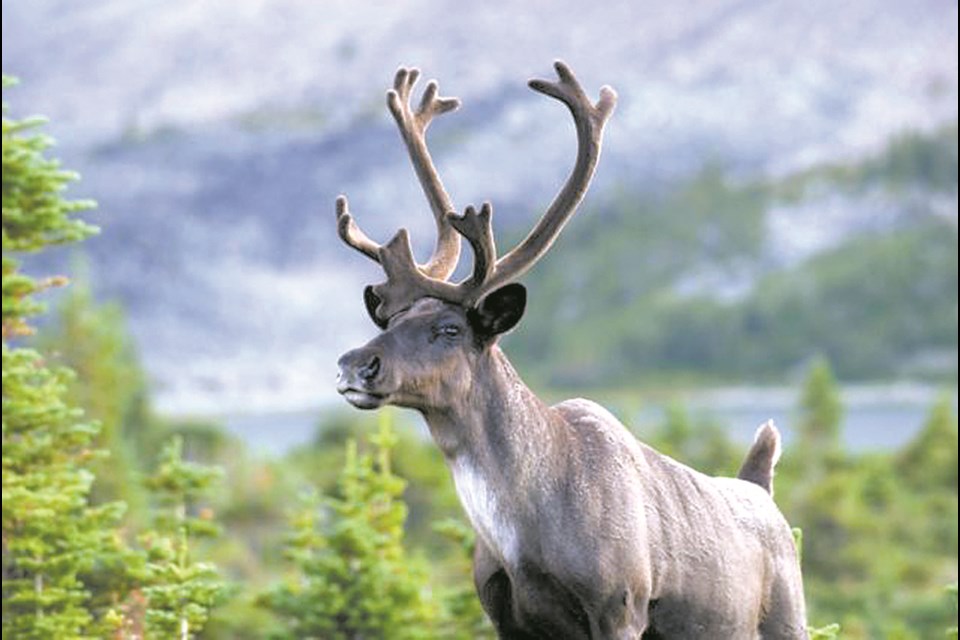BANFF – One of four caribou herds in Jasper National Park is extirpated.
Parks Canada quietly announced on its website that Jasper’s Maligne herd is gone and two other herds under the agency’s responsibility are too small to recover on their own.
The Maligne herd, down to about four animals in its remaining years, was last observed in 2018 and is considered extirpated, meaning locally extinct.
Environmentalists say saving caribou populations is perhaps the most widespread conservation issue currently facing Canada, noting the animals are under pressure throughout their range.
Alberta Wilderness Association is calling on Parks Canada to prevent the demise of Jasper’s Tonquin and Brazeau caribou herds and to manage Maligne range access for eventual caribou reintroduction there.
“The die off of Jasper’s entire Maligne caribou population is a tragic, predictable result of decades-long habitat and wildlife errors,” said Carolyn Campbell, AWA conservation specialist in a press release.
“[This was] reinforced in the last decisive decade by Parks Canada still catering to the recreation desires of a few above the habitat needs of endangered wildlife.”
- RELATED: Boost for caribou herds on hold
Caribou that live in Jasper National Park are part of a subset of woodland caribou herds called Southern Mountain caribou and are protected under the Species At Risk Act (SARA).
Twenty-five years ago, more than 800 caribou ranged in the mountain national parks. Today, fewer than 220 animals remain.
According to Parks Canada’s website, the Tonquin herd is estimated to have 45 caribou and the Brazeau herd to have fewer than 15 caribou.
“The Tonquin and Brazeau herds do not have enough female caribou – 10 or fewer in each herd – to be able to grow the herds,” states the website.
“The Tonquin and Brazeau herds are now so small that they cannot recover on their own.”
The other herd, referred to as the À La Pêche, is a partially migratory group of about 150 animals on Jasper’s northern boundary that is primarily managed and monitored by the province of Alberta.
“Some animals in the herd stay in Jasper National Park year-round, some stay in the foothills of Alberta’s Rocky Mountains, and some migrate back and forth,” according to Parks Canada’s website.
In neighbouring Banff National Park, woodland caribou were extirpated in 2009 when the last five animals in that tiny remnant herd died in an avalanche near Molar Creek north of Lake Louise.
Caribou historically occurred in two regions of Banff National Park – the herd wiped out in the avalanche spent time in the Upper Pipestone and Siffleur valleys. Caribou in the Nigel Pass area were thought to be part of the Brazeau herd.
The plan was to reintroduce caribou into Banff, but it’s not clear if that is off the table at this point.
Parks Canada did not grant an interview request, but in a statement indicated recovery efforts in Jasper are the priority.
“Banff National Park continues to meet its legal commitments under SARA by protecting critical woodland caribou habitat, even in the absence of caribou themselves,” according to the statement.
“Parks Canada’s recent species recovery efforts for the Banff-Jasper local population unit have largely centred on Jasper National Park, which has active herds of caribou, historically higher density populations, and more abundant habitat.”
According to Parks Canada’s 2017 multi-species action plan for Banff National Park, restoring caribou to the park may require an active reintroduction effort supported by a multi-partner, multi-jurisdictional captive breeding program.
The plan indicates this may be more challenging than augmenting existing populations, such as those in Jasper National Park.
“Caribou recovery efforts in Banff National Park will be contingent on the availability of captive-bred animals, and the persistence of a sufficient amount of suitable habitat with low predation risk,” it states.
“Any future reintroduction of caribou would be coordinated with the work of other mountain parks.”
Meanwhile, AWA is asking Parks Canada to consider an emergency population augmentation program for Tonquin and Brazeau caribou.
The organization also wants the federal agency to retain hard-won winter access limits in the Maligne range and consider further measures in Tonquin and Brazeau habitat to support caribou recovery.
In 2002, a temporary winter closure of Maligne Lake Road, approved by Jasper’s superintendent based on extensive evidence, was overturned by Parks Canada CEO as "unnecessary."
Campbell said keeping the Maligne Lake winter road open every subsequent winter to recreation traffic, up to today, was a death sentence for Maligne caribou, giving wolves easy predation access as caribou numbers spiraled down.
“The ‘four month per year’ ski trail closures since 2016 were overdue measures that unfortunately proved too late to recover the tiny remaining population,” she said.
In the statement provided by Parks Canada, officials indicated the agency is committed to the protection and recovery of woodland caribou in the mountain national parks.
“Reintroduction is only one strategy to meet the broad number of overarching objectives listed under Canada’s recovery strategy for the southern mountain population of woodland caribou,” it stated.




